Posted August 7, 2021 by Nicky in Reviews / 0 Comments
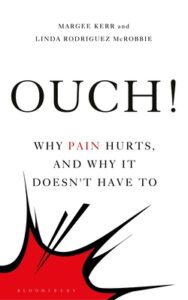 Ouch!: The New Science of Pain, Linda Rodriguez McRobbie, Margee Kerr
Ouch!: The New Science of Pain, Linda Rodriguez McRobbie, Margee Kerr
I’d somewhat feared when I picked this book up that it would be unsympathetic to those with chronic pain, in the way that some doctors are at the moment, because the overprescription of opiates is so much on their minds that everyone reporting pain sounds like a drug seeker to them. There is a bit of commentary on the fact that modern people are more likely to report pain and to be afraid of pain, etc, etc, but overall I found that the two authors were fairly sympathetic and willing to seek out multiple views.
One of the authors has experience with chronic pain and a degenerative illness, and both of them make sure to position themselves so the reader understands where they’re coming from — perhaps too autobiographical for some when it comes to popular science, but I think it was valuable in this case. Either way, both seem to have done a lot of research, including hands-on. Their attitude does lean toward “pain is a good thing and painkillers are generally the wrong treatment”, but doesn’t exclude the usefulness of painkillers for some people. It’s mostly sensitive and sympathetic, as I said, including toward the BDSM community, whose attitudes toward pain they also discuss.
It’s a layperson-friendly guide to what we understand about pain, not just biologically (although it does discuss that) but also psychologically and socially… and it discusses not just physical pain, but to some degree emotional pain as well (particularly as you can’t really have one without the other: human experience isn’t neatly divided like that). It was what I’d hoped for from another book which was much more about responses to pain, so that was nice. Overall, it’s super readable, and I flew through it.
Rating: 4/5
Tags: book reviews, books, non-fiction, science
Posted August 6, 2021 by Nicky in Reviews / 0 Comments
 Elephants on Acid, Alex Boese
Elephants on Acid, Alex Boese
I was warned by reviews that Boese covers some abhorrent experiments on animals without any kind of critique, and that’s correct. Boese seems more interested in the shock and amusement factor of some of these experiments, including expecting people to be rather shocked that scientists have tried to study sex in the lab. I actually knew about most of these experiments and findings before, so there was nothing much shocking or surprising for me — except his casual tone about animal experimentation.
(I’m not personally against animal experimentation when necessary, when there’s a possibility of great benefit. I think. It’s a stance that wavers across time, something that I have great difficulty with. What I never change my mind on is unnecessary experimentation: harming animals just to see what happens. Like giving them a massive and deadly overdose of acid, for example.)
It’s a good overview of some “weird” experiments, some of which have produced useful results. Otherwise, meh?
Rating: 2/5
Tags: Alex Boese, book reviews, books, non-fiction, science
Posted August 5, 2021 by Nicky in Reviews / 1 Comment
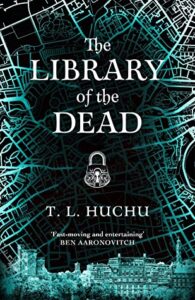 The Library of the Dead, T.L. Huchu
The Library of the Dead, T.L. Huchu
I found it a bit unfortunate that the cover design for this book was so reminiscent of the Rivers of London series by Ben Aaronovitch. Maybe a tad more unfortunate again that he actually blurbed it, bringing the comparison even more forcibly to mind. There’s much that is different, of course, from the location (Edinburgh) and the setting (a future in which the divisions between rich and poor are even greater, a world where magic is a known thing, etc)… but there were some similarities that just wouldn’t stop getting between me and the story.
It didn’t help, too, that I found the narrative voice a little unconvincing as that of a fifteen-year-old. Sure, people grow up fast in adversity, but I could never picture her the way she kept describing herself. I mean, not that I “picture” anything anyway, but what I mean is that things just didn’t quite add up for me, and it was really distracting.
There were some parts I loved, like pretty much every interaction between Ropa and her grandmother, and the idea of the hidden Library of the Dead, and the badass wheelchair-user who gets involved to help Ropa solve the mystery. I was intrigued by the world as well, how things came to be the way they are: it never over-explains that, leaving you to glean it from the details, and that was kind of frustrating at first because I didn’t know, going in, whether this was “real” Edinburgh or not… but it’s always an interesting reading experience.
I don’t know if it’s an experience I’d care to repeat with more books in the same series, which is obviously where things are going with the repeated mention of the Tall Man. Meh? Maybe I’ll pick it up if this first book sticks with me more than I expected — that happens, sometimes.
Rating: 3/5
Tags: book reviews, books, SF/F, T.L. Huchu
Posted August 4, 2021 by Nicky in Reviews / 0 Comments
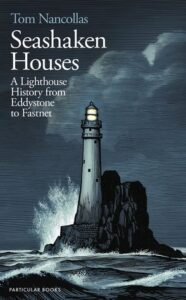 Seashaken Houses, Tom Nancollas
Seashaken Houses, Tom Nancollas
This was a complete impulse-buy on my part; something about it just really drew me, in the moment, so I went ahead and grabbed it. I read it right away to try to capitalise on that, and it was the perfect thing for my mood: it’s a history of a number of specific lighthouses and how they relate to the development of rock lighthouses in the UK, but also a personal response to them in many ways –Nancollas’ enthusiasm and interest, along with his imaginings about the lighthouses, really shine through. Do I really care about how the light of a particular lighthouse was installed? Only because he did, and made it sound interesting.
There were a couple of bits I found a bit overly sentimental or kinda purple-prose-y, and I had a roll of my eyes when he referenced King Arthur and got something wrong (Arthur died at Camlann, not anywhere else, in most versions of the Arthurian stories)… but mostly it just really hit the spot. I love it when someone can take a topic that I have very little personal connection to, and make it fascinating. If that sounds interesting to you too, then I recommend this!
Rating: 4/5
Tags: book reviews, books, history, non-fiction, Tom Nancollas
Posted August 3, 2021 by Nicky in Reviews / 0 Comments
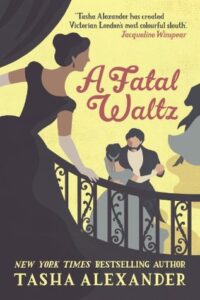 A Fatal Waltz, Tasha Alexander
A Fatal Waltz, Tasha Alexander
In this book, Lady Emily is now engaged to Colin, and gets drawn into his world of espionage in her quest to clear the name of someone close to her. The trip takes her to Vienna, where she consorts with the best and worst… and with a woman Colin once loved, and who still wants to be with Colin herself (despite her marriage). Jealousy isn’t a good look on Lady Emily, and I was embarrassed for her when she slipped and revealed her lack of trust in Colin. I joke about being the relationship advice Dalek, but really, communicate!
Aside from the plotline of jealousy, it turns out someone else is in love with Emily (groan), so there are two jealousy plotlines here, both involving unrequited love. I admit that this book is not my favourite so far because of that, though the investigation plot was actually fairly engaging. I enjoyed Emily’s dip into espionage, even if it all got a little melodramatic.
In the end, it’s a fun read, just didn’t quite capture me the way the previous books have!
Rating: 3/5
Tags: book reviews, books, crime, historical fiction, mystery, romance, Tasha Alexander
Posted August 2, 2021 by Nicky in Reviews / 0 Comments
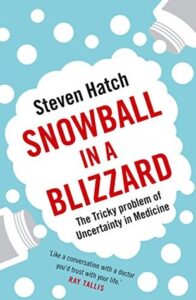 Snowball in a Blizzard, Steve Hatch
Snowball in a Blizzard, Steve Hatch
Snowball in a Blizzard is a great examination of something that goes overlooked far too often — or blown out of proportion in ways that serve weird fringe agendas: the fact that very little in medicine is certain, and it’s not possible to put numbers on many/most things about biology. People forget that when looking for certainty about how to reduce their risk of cancer, or blow it up into something quite different when they want to argue against the importance of vaccines… and it’s really important to understand why there is uncertainty in medicine and what it really means, if you want to make truly informed decisions about your own healthcare. Informing people about this is Steve Hatch’s aim here, and I think he does a great job.
There are one or two points which have suffered a bit in time — for instance, the Rosenhan experiments that he leans on heavily to make a point or two have been discredited, with Susannah Cahalan’s The Great Pretender arguing pretty convincingly that Rosenhan falsified much of the data in his study, which was never run in the way he described. There are also some references to SARS, which are pretty apocalyptic… But broadly speaking, Hatch’s points hold true.
There’s some really fascinating stuff here that I knew very little about. For example, screening mammography — mammograms for people who have not discovered lumps or had any other symptoms of breast cancer — is, on balance, probably harmful for most people. This doesn’t mean that diagnostic mammography is a bad thing, but the indiscriminate screening of everyone in certain groups includes far too many people who are at too low a risk of cancer. Thus, false positives are common, and a lot of mental distress results — and sometimes worse, with people even ending up having unnecessary mastectomies.
Hatch explains the statistics underlying evidence-based medicine really well. I don’t have a good instinctive grasp of statistics, and never have, and this book helped some of these concepts lodge in my brain — which was nice, because I had an exam coming up at that point on exactly some of these types of statistics. I think it would be really useful for anyone who wants to understand better how uncertainty in medicine works and what that might mean for making decisions about your own care.
Rating: 4/5
Tags: book reviews, books, non-fiction, science, Steve Hatch
Posted August 1, 2021 by Nicky in Reviews / 0 Comments
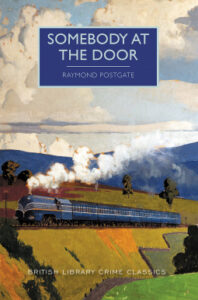 Somebody at the Door, Raymond Postgate
Somebody at the Door, Raymond Postgate
I didn’t think this book was going to come together well, after reading a couple of chapters. It consists mostly of character sketches, which constitute little thumbnails of lives which might (maybe) give the characters motive, means and opportunity for the murder which occurs at the start of the book. They’re quite disconnected, and they go some very different places — one cobbler ruined by a scam who turns to pickpocketing and then goes straight again; one mini-spy story in which a German refugee is rescued by a determined but naive and rich young Englishman; one miniature love story chronicling an adulterous affair…
And in a way, they don’t really pull together, in that the various stories barely touch at all, but they do manage to achieve something: I very much knew who I wanted to be the murderer, and I knew who I didn’t want to be the murderer. I won’t spoil anything about who is who, but it’s perhaps useful to know going in that the effect does work in the end! I wouldn’t say it’s a favourite, but it comes out as surprisingly solid.
Rating: 3/5
Tags: book reviews, books, British Library Crime Classics, crime, mystery, Raymond Postgate
Posted July 31, 2021 by Nicky in General / 2 Comments
Gooood evening! I had a busy day of, um, questing on FFXIV… so I’m only just setting up this post now. Not that I have much to report! No new books, and only a couple of books read.
Books read this week:


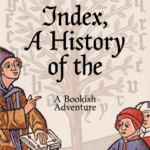
Reviews posted this week:
Aaand that’s it for me, for this week. How’s everyone doing?
Tags: books, Stacking the Shelves, weekly roundup
Posted July 31, 2021 by Nicky in Reviews / 0 Comments
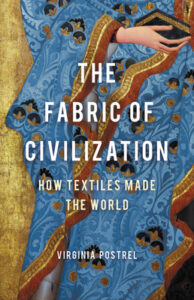 The Fabric of Civilization: How Textiles Made The World, Virginia Postrel
The Fabric of Civilization: How Textiles Made The World, Virginia Postrel
This book looks at fabric not as an art but as a piece of technology, a scientific endeavour. Separate chapters discuss various themes: how the first thread was made, and the impact of selective breeding and experimentation in finding threads long enough to work with, for instance. I found the chapter on dyes particularly interesting, to be honest.
There was one thing that I found kind of weird, and that was some of the perspectives Postrel takes. Like she defends the low-paid status of women who spun thread because it would be cost-prohibitive to pay them more — cloth would be too expensive if people were paid more, so it can’t be done (instead of valuing people’s work at what it’s worth). And she’s very much automatically on the side of the middlemen who sold cloth for others, saying they were unfairly treated by people who didn’t know the worth of what they did? (Rather than what is more likely which is that it’s a bit of both.) It hits weirdly for me.
The chapter on new fabrics was pretty fascinating as well. I’d kind of like to see this on Great British Sewing Bee: here is this new fabric, here are its properties, make something out of it.
Anyway, overall pretty enjoyable and informative; I wish I was a bit more visual so I could understand exactly what’s going on in some of the descriptions, but that’s not the author’s fault — I can never picture anything, no matter how well you describe it.
Rating: 4/5
Tags: book reviews, books, history, non-fiction, Virginia Postrel
Posted July 30, 2021 by Nicky in Reviews / 0 Comments
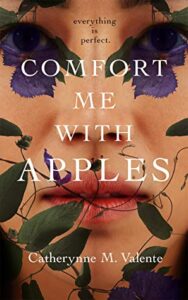 Comfort Me With Apples, Catherynne M. Valente
Comfort Me With Apples, Catherynne M. Valente
Received to review via Netgalley; publication date 26th October 2021
This is a novella which takes a number of different elements and whisks them together — and to explain too much about what exactly goes into the mix might tip you off about what’s going on in Valente’s Arcadia, so I won’t. As you’d expect of Valente, it’s rich language with lots of descriptions, and it’s worth lingering over to let her paint the pictures for you. Even as a very non-visual person, it always works.
I feel like I’m missing a lot about how the story is put together — there’s an obvious level that is quickly apparent, of course, but I think there’s most likely a lot more that I didn’t catch onto at first. I’ll probably at least skim through it again and see what I can spot.
It’s clever, but because of the nature of the story — again, not saying too much — there’s not a lot to grab onto in terms of character, which is often how I get most hooked into a story. So it’s not a favourite, for that reason, but something I did enjoy reading.
Rating: 3/5
Tags: book reviews, books, Catherynne M. Valente, SF/F
 Ouch!: The New Science of Pain, Linda Rodriguez McRobbie, Margee Kerr
Ouch!: The New Science of Pain, Linda Rodriguez McRobbie, Margee Kerr










